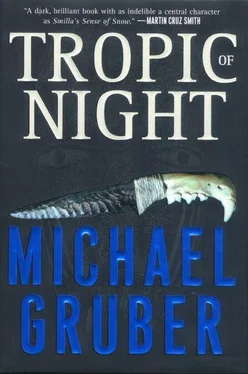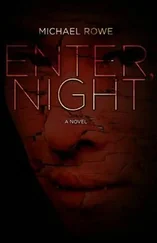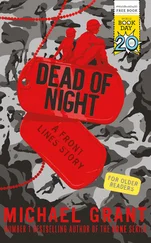Michael Gruber - Tropic of Night
Здесь есть возможность читать онлайн «Michael Gruber - Tropic of Night» весь текст электронной книги совершенно бесплатно (целиком полную версию без сокращений). В некоторых случаях можно слушать аудио, скачать через торрент в формате fb2 и присутствует краткое содержание. Жанр: Полицейский детектив, на английском языке. Описание произведения, (предисловие) а так же отзывы посетителей доступны на портале библиотеки ЛибКат.
- Название:Tropic of Night
- Автор:
- Жанр:
- Год:неизвестен
- ISBN:нет данных
- Рейтинг книги:4 / 5. Голосов: 1
-
Избранное:Добавить в избранное
- Отзывы:
-
Ваша оценка:
- 80
- 1
- 2
- 3
- 4
- 5
Tropic of Night: краткое содержание, описание и аннотация
Предлагаем к чтению аннотацию, описание, краткое содержание или предисловие (зависит от того, что написал сам автор книги «Tropic of Night»). Если вы не нашли необходимую информацию о книге — напишите в комментариях, мы постараемся отыскать её.
Tropic of Night — читать онлайн бесплатно полную книгу (весь текст) целиком
Ниже представлен текст книги, разбитый по страницам. Система сохранения места последней прочитанной страницы, позволяет с удобством читать онлайн бесплатно книгу «Tropic of Night», без необходимости каждый раз заново искать на чём Вы остановились. Поставьте закладку, и сможете в любой момент перейти на страницу, на которой закончили чтение.
Интервал:
Закладка:
We walked out of the frosty emporium to the sun-sizzled parking lot and into my car, a Buick Regal, in blue, from 1978. Its body is pretty well rusted out, the rocker panels having achieved the texture of autumn leaves. Both passenger windows are cracked, and the trunk doesn’t lock. A yellow chenille bedspread serves as the front seat cover. On the other hand, it has the V-8 in there and the engine, the drive train, and all the running gear are as tuned and as slick-running as it is possible for a twenty-year-old machine to be. It is the kind of car you want for pulling bank jobs and getting away: fast, reliable, anonymous. I did all the car work myself. My dad taught me. He collected and restored cars. Still does, I suppose, although I haven’t been in contact with home of late. I tell myself it’s for their protection.
We got into the car, and rolled out of the lot onto U.S. 1. We live in Coconut Grove, a part of the city of Miami. It’s a nice place to live, if one is actually living, and if not, people there tend to leave you alone. It retains some of the louche and freewheeling atmosphere it was famous for some years ago, but if you talk to anyone who was here in the sixties and seventies, they will assure you that it’s ruined. I once spoke with an old woman who said that the best time was before the war. She meant the second world one. Nobody had a dime, she said, but we knew we were living in paradise. In those days, huge flying boats used to come down from New York and land on Biscayne Bay right at Coconut Grove and the wealthy passengers would have dinner ashore. The place is still called Dinner Key and the great hangars still exist. The Grove is certainly ruined, as will be any place in America that has cheap funky housing and artists living in it and some community energy going on. The rich people want to be around that, having drained it out of their own lives in the course of making a pile, and so they move in and build great big houses and shopping malls, and create the quaint, where once there was real.
Of course, the Grove is not as ruined as it might have been because black people live there, in their own mini-ghetto west of Grand and south of McDonald. In America, if you are willing to tolerate the sight of a black face on the street you can get a good deal on your housing and the developers will not bother you until they have chased all of them away.
We live on Hibiscus Street off Grand, in a neighborhood that clearly is scheduled for gentrification, being on the good (or white) side of Grand, but that repels the money boys still because half the houses are owned by black people who have not yet been taxed out. They are Bahamians and Dominicans and African-Americans. The rest of the inhabitants are white people who don’t mind this or positively love it. Myself, I’m as indifferent to race as it is possible to be: that is, I am somewhat racist, like everyone else in my nation. There is no escape. On our street we have several run-down cinder-block apartment houses, painted pink or aqua, so there is transience and a moderate amount of crime. This is fine with me; the transience is cloaking; I have nothing to steal; I can defend my body against anything but a gun.
Our apartment is above a garage, painted brick red with white trim, like a barn. The front room has two tiny windows looking out on a dust-and-shell driveway, and the back room, where I sleep, has a big sliding glass window from which you can see a tangled hedge of cream hibiscus and pink oleander. The window is so large and the room is so small that when the window is open it is almost like sleeping outside, or in an African house.
In my bedroom is a thin mattress, resting on a door, supported by six screw-on legs, each of which stands in a can half full of water. This is an old fieldworker trick to keep the roaches from chewing the dead skin off you while you sleep. The child sleeps there now. I have my string hammock, slung from hooks in the wall, low, so I can watch her and touch her if I wish. The rest of the furniture is junk from the garage or collected during walks around the neighborhood: a warped pine bureau with two out of three drawers, a chaise lounge I restrung with thick cotton rope, a pine table, three mismatched wooden straight chairs, a pink fur bean bag, a brick-and-board bookshelf. Over the table is a hanging bulb in a Japanese paper globe. Next to the kitchen is a tiny bathroom, with a stained claw-foot tub with shower and the usual facilities. Its once-white walls are scabrous with mildew. We have no air-conditioning. A fourteen-inch Kmart fan blows garden air over us at night. The one closet is an anal-obsessive’s fantasy of order, although I don’t recall being particularly obsessive when I was living real life. It’s just that I’ve spent a lot of my time in VW vans, and Land Rovers, and tents, and hovels, and boats, and I’m very good at storage and retrieval. Kmart sells a nice line of wire-rack organizers and I’ve bought largely in their closet department. When I moved in here, the walls were pink-orange and the floor was covered with avocado shag. I decided that, if I was going to die here, I didn’t want my last sensory impression to be avocado shag, and so I ripped it up and replaced it with cheap black vinyl tiles and I painted the walls white. The walls are bare. When I was laying the tiles I found a corner missing out of one of the four-by-eight plywood sheets of the floor. I made a plywood hatch for this hole, and tiled over it, and it fits so closely that you have to yank it up with a big glazier’s suction cup. What I have to hide, I hide there.
After Kmart, we drove to the Winn-Dixie, where I now shop. I used to eat so little that it wasn’t worth going to the supermarket and I’d just pick up something, yogurt, or chicken, or soup, at a convenience store. That’s where I found the child, in a mini-mart on the east side of Dixie Highway, down south someplace. I forget what I was doing there, but sometimes, at night, in the summer, the sticky heat and the insect noises remind me of Africa, and I have to ride, to hear the mechanical sounds of driving and smell exhaust, the dear stench of my homeland, and feel the wind of speed on my face. At around two in the morning, I went in to get a cold drink and she was there, filthy, in ragged shorts and a torn pink T-shirt and flip-flops, standing in the aisle. She was shaking.
I said to her, “Are you okay? Are you lost?” She didn’t answer. The woman behind the counter was fussing with the frozen slush machine and had her back turned. I walked away to the drink console.
As I reached for a cup, I heard the first slap and looked around. The mother was there, a large tan woman in her twenties, with her hair in curlers under a green print scarf. She was wearing Bermudas and a tube top that barely covered her bobbling breasts. Whoever she had once been, that person was gone, or in deep hiding, and only a demon stared out of the red-rimmed eyes. The child was holding her hand to her ear, and her face was screwed up like a piece of crumpled tinfoil, but she made no sound.
“What did I tell you? Huh?” said the mother. She held a forty-ounce bottle of malt liquor in one hand. With the other she beat the child, big roundhouse blows that knocked the little girl against a frozen-food lowboy hard enough to bounce.
“What did I tell you, you stupid little bitch? Huh? (Slap.) Huh? Did I tell you not to move? (Slap.) I told you not to move, didn’t I? (Slap.) Wait’ll I get you back home, I’ll fix you good. (Slap.) What the fuck you lookin’ at, bitch?”
This last was directed at me. I pulled my eyes away from the scene and left. I stood with my cold hands pressed to the warm hood of my car and took deep breaths. I thought of what the Olo say, of something that happens between an adult and a particular child, part of their weird rearing practices. But that was in Africa, I told myself. I tried hard to shut down the feeling.
Читать дальшеИнтервал:
Закладка:
Похожие книги на «Tropic of Night»
Представляем Вашему вниманию похожие книги на «Tropic of Night» списком для выбора. Мы отобрали схожую по названию и смыслу литературу в надежде предоставить читателям больше вариантов отыскать новые, интересные, ещё непрочитанные произведения.
Обсуждение, отзывы о книге «Tropic of Night» и просто собственные мнения читателей. Оставьте ваши комментарии, напишите, что Вы думаете о произведении, его смысле или главных героях. Укажите что конкретно понравилось, а что нет, и почему Вы так считаете.












